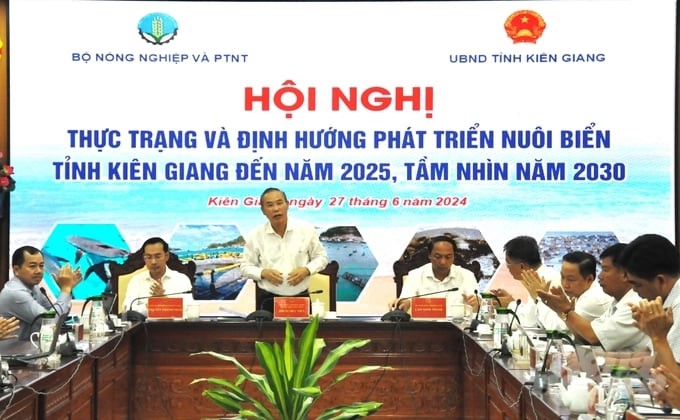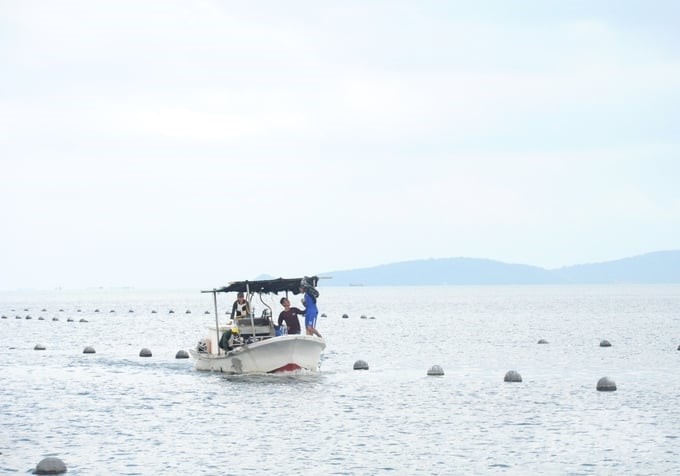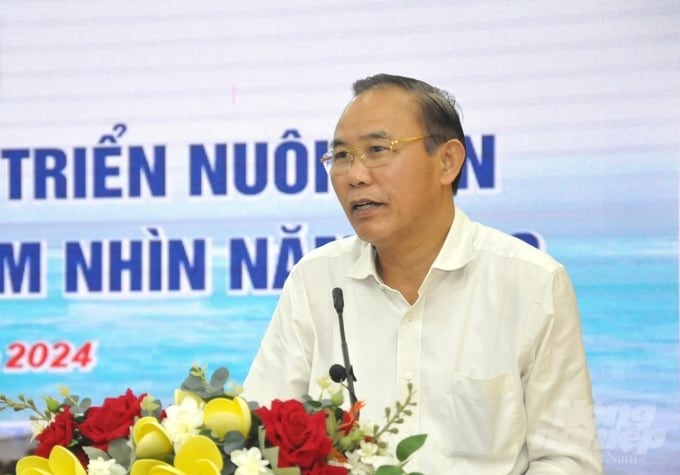June 15, 2025 | 04:56 GMT +7
June 15, 2025 | 04:56 GMT +7
Hotline: 0913.378.918
June 15, 2025 | 04:56 GMT +7
Hotline: 0913.378.918
On June 27, in Rach Gia City, the Kien Giang Provincial People's Committee coordinated with the Ministry of Agriculture and Rural Development to organize a "Conference on the current status and orientation of marine farming development in Kien Giang province until 2030." Deputy Minister of Agriculture and Rural Development Phung Duc Tien and Chairman of the Kien Giang Provincial People's Committee Lam Minh Thanh co-chaired the conference.

Deputy Minister Phung Duc Tien co-chaired the "Conference on the current status and orientation of marine farming development in Kien Giang province until 2030." Photo: Trung Chanh.
The conference aims to evaluate the current status of marine aquaculture, problems, and difficulties in marine area management to serve as a basis for proposing effective state management solutions in marine area management and focusing on resources to synchronously and effectively deploy tasks and solutions to promote marine farming development in an industrial, modern, and sustainable direction.
Mr. Tran Dinh Luan, Director of the Department of Fisheries, assessed that Vietnam's potential for marine farming is very large. Currently, the whole country has 9.5 million m3 of cages for raising marine fish of all kinds, lobsters, and 57,000 cages for mollusk farming.
Annual marine farming output reaches about 800,000 tons, of which mollusks, marine fish, and lobsters account for over 62%; the rest are other subjects. The export turnover value reaches USD 0.8–1 billion.

Kien Giang has a wide sea area, a long coastline, many islands and sheltered bays, and is less prone to strong winds and storms, which is very favorable for the development of marine farming. Photo: Trung Chanh.
Particularly for Kien Giang, the sea area has many advantages for marine farming, such as a long coastline, many islands, sheltered bays, and less wind and storms. However, currently, Kien Giang fishermen's marine farming technology is still outdated, self-making by wood and using trash fish as the food source for fish. Thereby, it causes environmental pollution, the risk of disease transmission, and low effectiveness. Breeds also depend on imported sources and wild exploitation, so marine farming is passive. There is no effective marine farming chain. Current consumption of marine farming products is mainly through collectors, so prices are unstable.
In addition, current procedures for licensing investment in marine farming still have to go through many Ministries and branches and are very slow. Currently, the procedure for licensing marine aquaculture is carried out before the procedure for handing over marine farming areas, and both procedures require the submission of relevant documents on environmental impact assessment. Therefore, it is necessary to simplify procedures and interconnect administrative procedures to reduce legal compliance costs for organizations and individuals implementing marine farming projects.
Mr. Quach Van Toan, Deputy Director of the Kien Giang Department of Natural Resources and Environment, said that considering and handing over marine farming areas to organizations and individuals wishing to exploit and use marine resources in the province must be based on the National Marine Spatial Plan and the Master Plan on the Exploitation and Sustainable Use of Coastal Resources.
However, as of now, these plans have not been approved by competent authorities. Therefore, in order to implement the handover, the province has to consult with numerous relevant Ministries twice, which will take a lot of time. Meanwhile, Kien Giang province is promoting ocean economic development, and the number of applications requesting the handover of marine areas to carry out socio-economic activities is very large.

Deputy Minister Phung Duc Tien assessed that Kien Giang's marine farming potential is very large, with many aquatic species of high economic value meeting domestic and export demand. Photo: Trung Chanh.
Deputy Minister Phung Duc Tien assessed that the marine farming potential of Kien Giang in particular and Vietnam in general is very large, with many aquatic species of high economic value. Kien Giang's large fishing grounds and marine environment are favorable for the development of marine farming, both along the coast, around the islands, and offshore. Currently, the infrastructure and port system on the island and the Kien Giang Provincial Fisheries Center are being invested in and built to create conditions for marine farming to develop effectively and synchronously.
The Deputy Minister suggested that when localities focus on developing the ocean economy, they need to implement sectoral planning, national planning, integrate provincial planning, and focus on removing difficulties in sea surface handover so that businesses and fishermen can soon implement marine farming projects.
Focus on investing in agricultural and aquaculture infrastructure, ensuring that it meets the needs of aquaculture development. Train human resources to serve marine farming. Have policies to attract investment, especially from large corporations and businesses with cage technology, modern farming processes, mechanization of farming stages, and large output.
Raise multi-species of marine fish and seaweed, combined with tourism exploitation, to increase efficiency in the same area. Build a marine farming value chain; businesses investing in farming must associate it with processing and export.
Translated by Thu Huyen
/2025/06/12/3721-2-202745_83.jpg)
(VAN) TH made an impression at Seoul Food 2025 with its line of natural beverages, paving the way for Vietnamese food products to enter the South Korean market.

(VAN) Soc Trang's success in rice exports stems from a strategy of developing fragrant and specialty rice cultivation areas and standardizing production toward low-emission practices.
/2025/06/11/1311-5-120811_839.jpg)
(VAN) The pig farming industry is facing the challenge of comprehensive restructuring to meet requirements for quality, safety, traceability, and market expansion both domestically and for export.

(VAN) Vietnam considers participating in ALGROALBA in order to expand agricultural production, coordinate the assessment and effective exploitation potential land.
/2025/06/05/5314-1-184727_407.jpg)
(VAN) From seemingly worthless fish scales and skin, enzymes and lactic ferments can transform by-products into peptides, opening a sustainable, effective business direction and elevating Vietnamese seafood.

(VAN) TTC AgriS and IFC signed a strategic partnership to develop a sustainable agricultural value chain, aiming to achieve the Net Zero target by 2035.

(VAN) Seafood by-products are opening a new path, combining green growth and technological innovation to enhance the industry's value.